-
AuthorSearch Results
-
September 20, 2023 at 1:48 pm #7279
In reply to: Family Stories From The Other Side ~ Book Two
The Bigamist
Ernest Tomlinson 1881-1915
Ernest Tomlinson was my great grandfathers Charles Tomlinson‘s younger brother. Their parents were Charles Tomlinson the elder 1847-1907 and Emma Grattidge 1853-1911.
In 1896, aged 14, Ernest attempted to drown himself in the pond at Penn after his father took his watch off him for arguing with his brothers. Ernest tells the police “It’s all through my brothers putting on me”. The policeman told him he was a very silly and wicked boy and to see the curate at Penn and to try and be a better boy in future. He was discharged.
Bridgnorth Journal and South Shropshire Advertiser. – Saturday 11 July 1896:
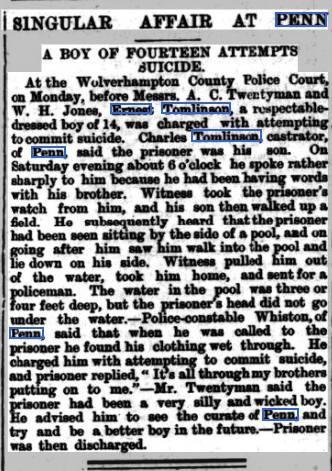
In 1903 Ernest married Ethel Maude Howe in Wolverhampton. Four years later in 1907 Ethel was granted a separation on the grounds of cruelty.
In Islington in London in 1913, Ernest bigamously married Mabel Elizabeth Smith. Mabel left Ernest for treating her very badly. She went to Wolverhampton and found out about his first wife still being alive.
London Evening Standard – Monday 25 May 1914:
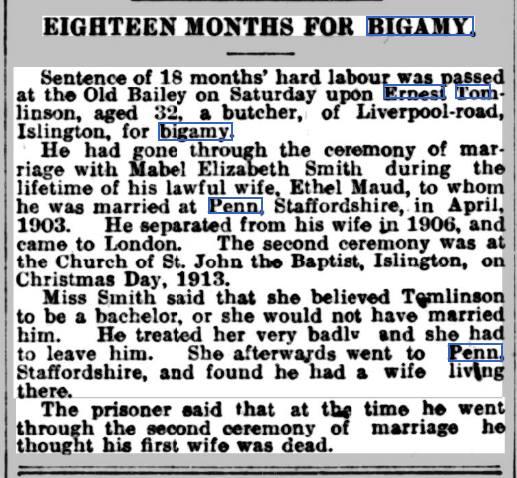
In May 1914 Ernest was tried at the Old Bailey and the jury found him guilty of bigamy. In his defense, Ernest said that he had received a letter from his mother saying that she was ill, and a further letter saying that she had died. He said he wrongly assumed that they were referring to his wife, and that he was free to marry. It was his mother who had died. He was sentenced to 18 months hard labour at Wormwood Scrubs prison.
Woolwich Gazette – Tuesday 28 April 1914:
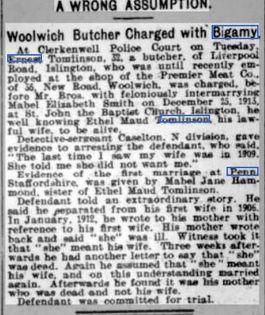

Ethel Maude Tomlinson was granted a decree nisi in 1915.
Birmingham Daily Gazette – Wednesday 02 June 1915:
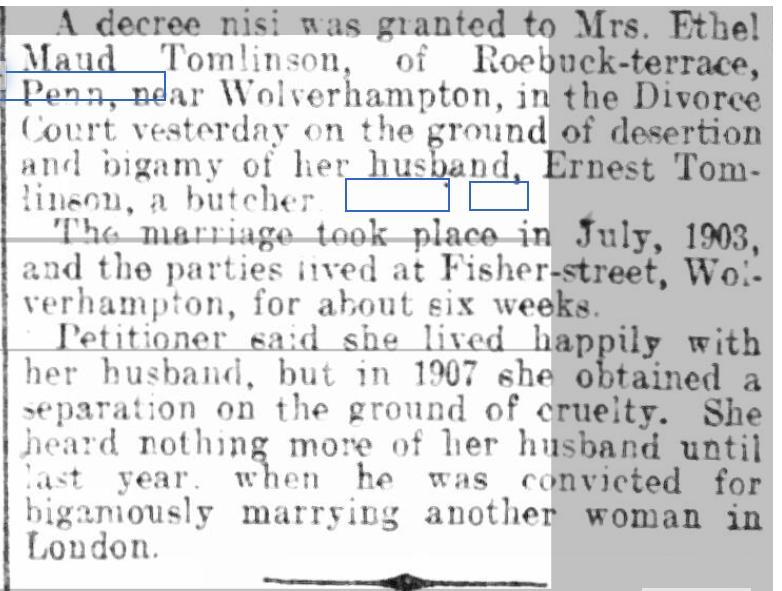
Ernest died in September 1915 in hospital in Wolverhampton.
August 15, 2023 at 12:42 pm #7267In reply to: Family Stories From The Other Side ~ Book Two
Thomas Josiah Tay
22 Feb 1816 – 16 November 1878
“Make us glad according to the days wherein thou hast afflicted us, and the years wherein we have seen evil.”
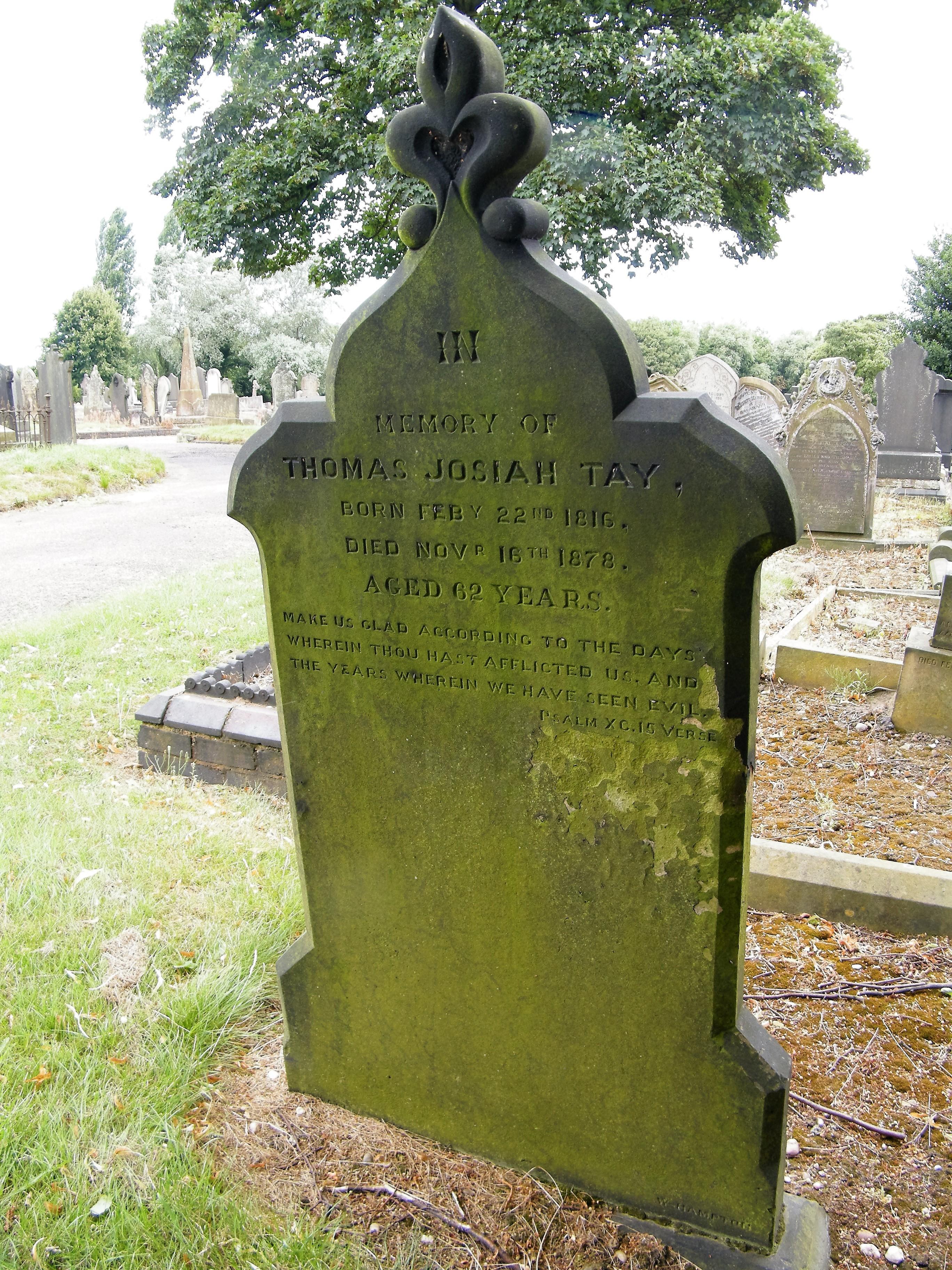
I first came across the name TAY in the 1844 will of John Tomlinson (1766-1844), gentleman of Wergs, Tettenhall. John’s friends, trustees and executors were Edward Moore, surgeon of Halesowen, and Edward Tay, timber merchant of Wolverhampton.

Edward Moore (born in 1805) was the son of John’s wife’s (Sarah Hancox born 1772) sister Lucy Hancox (born 1780) from her first marriage in 1801. In 1810 widowed Lucy married Josiah Tay (1775-1837).
Edward Tay was the son of Sarah Hancox sister Elizabeth (born 1778), who married Thomas Tay in 1800. Thomas Tay (1770-1841) and Josiah Tay were brothers.
Edward Tay (1803-1862) was born in Sedgley and was buried in Penn. He was innkeeper of The Fighting Cocks, Dudley Road, Wolverhampton, as well as a builder and timber merchant, according to various censuses, trade directories, his marriage registration where his father Thomas Tay is also a timber merchant, as well as being named as a timber merchant in John Tomlinsons will.
John Tomlinson’s daughter Catherine (born in 1794) married Benjamin Smith in Tettenhall in 1822. William Tomlinson (1797-1867), Catherine’s brother, and my 3x great grandfather, was one of the witnesses.
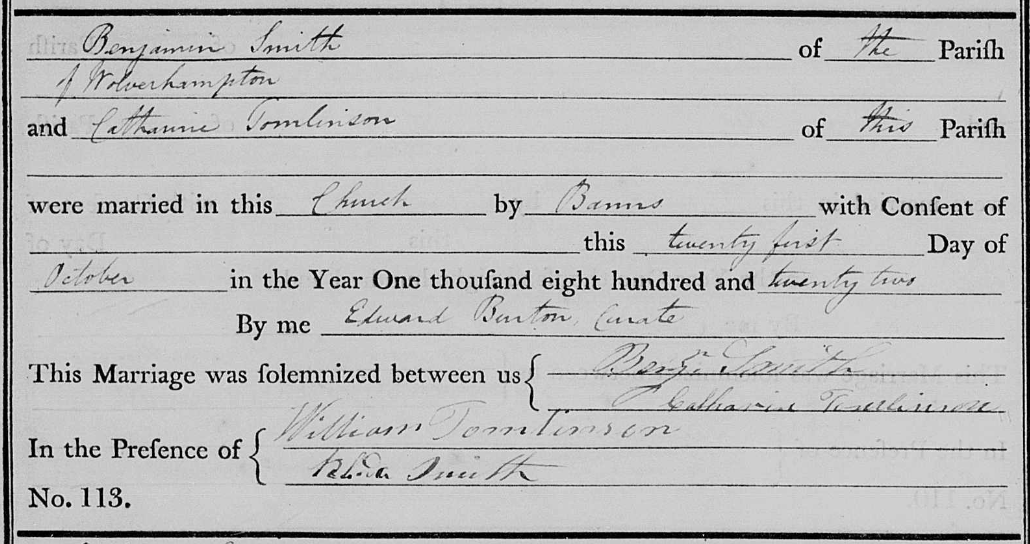
Their daughter Matilda Sarah Smith (1823-1910) married Thomas Josiah Tay in 1850 in Birmingham. Thomas Josiah Tay (1816-1878) was Edward Tay’s brother, the sons of Elizabeth Hancox and Thomas Tay.
Therefore, William Hancox 1737-1816 (the father of Sarah, Elizabeth and Lucy), was Matilda’s great grandfather and Thomas Josiah Tay’s grandfather.
Thomas Josiah Tay’s relationship to me is the husband of first cousin four times removed, as well as my first cousin, five times removed.
In 1837 Thomas Josiah Tay is mentioned in the will of his uncle Josiah Tay.

In 1841 Thomas Josiah Tay appears on the Stafford criminal registers for an “attempt to procure miscarriage”. He was found not guilty.
According to the Staffordshire Advertiser on 14th March 1840 the listing for the Assizes included: “Thomas Ashmall and Thomas Josiah Tay, for administering noxious ingredients to Hannah Evans, of Wolverhampton, with intent to procure abortion.”
The London Morning Herald on 19th March 1840 provides further information: “Mr Thomas Josiah Tay, a chemist and druggist, surrendered to take his trial on a charge of having administered drugs to Hannah Lear, now Hannah Evans, with intent to procure abortion.” She entered the service of Tay in 1837 and after four months “an intimacy was formed” and two months later she was “enciente”. Tay advised her to take some pills and a draught which he gave her and she became very ill. The prosecutrix admitted that she had made no mention of this until 1939. Verdict: not guilty.
However, the case of Thomas Josiah Tay is also mentioned in a couple of law books, and the story varies slightly. In the 1841 Reports of Cases Argued and Rules at Nisi Prius, the Regina vs Ashmall and Tay case states that Thomas Ashmall feloniously, unlawfully, and maliciously, did use a certain instrument, and that Thomas Josiah Tay did procure the instrument, counsel and command Ashmall in the use of it. It concludes that Tay was not compellable to plead to the indictment, and that he did not.
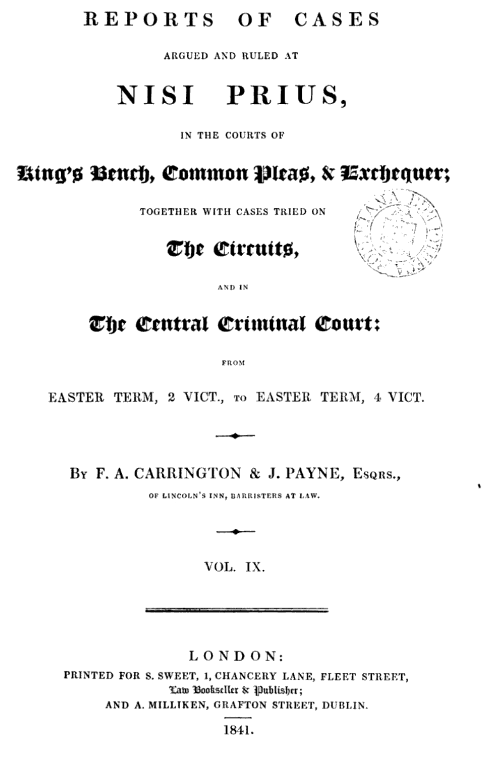
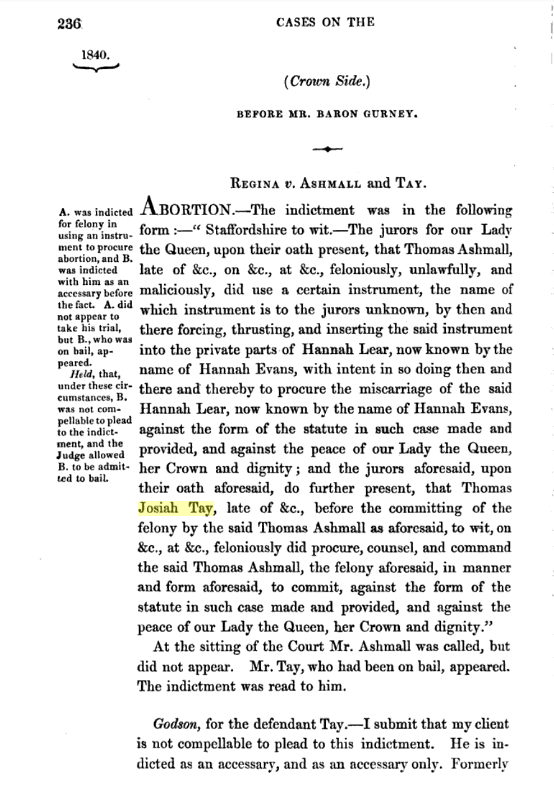
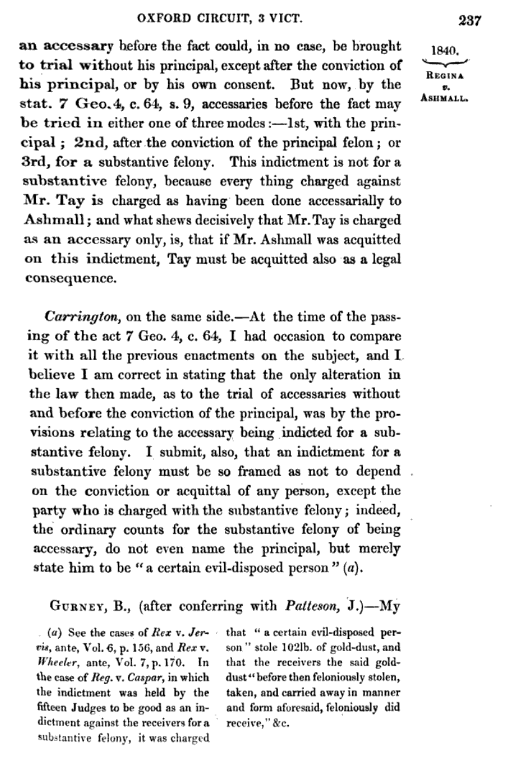
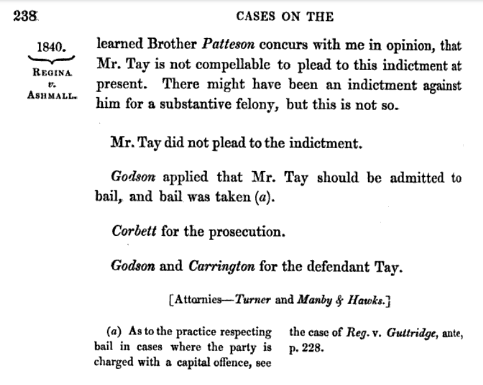
The Regina vs Ashmall and Tay case is also mentioned in the Encyclopedia of Forms and Precedents, 1896.
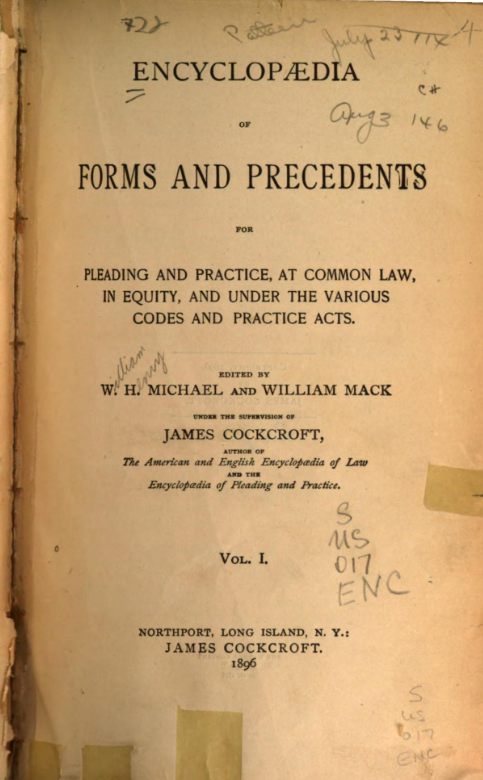
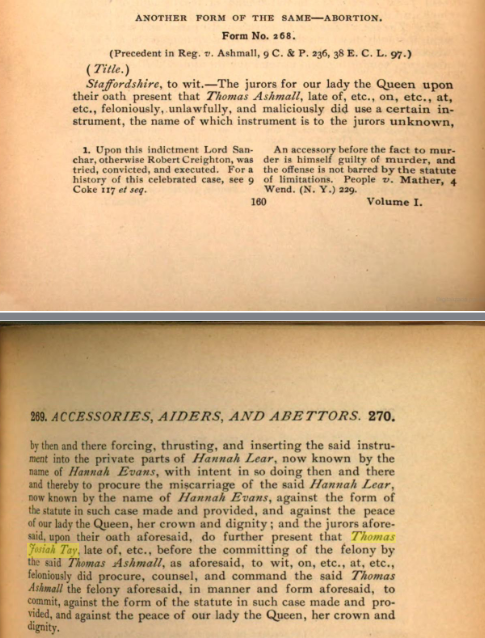
In 1845 Thomas Josiah Tay married Isabella Southwick in Tettenhall. Two years later in 1847 Isabella died.
In 1850 Thomas Josiah married Matilda Sarah Smith. (granddaughter of John Tomlinson, as mentioned above)
On the 1851 census Thomas Josiah Tay was a farmer of 100 acres employing two labourers in Shelfield, Walsall, Staffordshire. Thomas Josiah and Matilda Sarah have a daughter Matilda under a year old, and they have a live in house servant.
In 1861 Thomas Josiah Tay, his wife and their four children Ann, James, Josiah and Alice, live in Chelmarsh, Shropshire. He was a farmer of 224 acres. Mercy Smith, Matilda’s sister, lives with them, a 28 year old dairy maid.
In 1863 Thomas Josiah Tay of Hampton Lode (Chelmarsh) Shropshire was bankrupt. Creditors include Frederick Weaver, druggist of Wolverhampton.
In 1869 Thomas Josiah Tay was again bankrupt. He was an innkeeper at The Fighting Cocks on Dudley Road, Wolverhampton, at the time, the same inn as his uncle Edward Tay, aforementioned timber merchant.
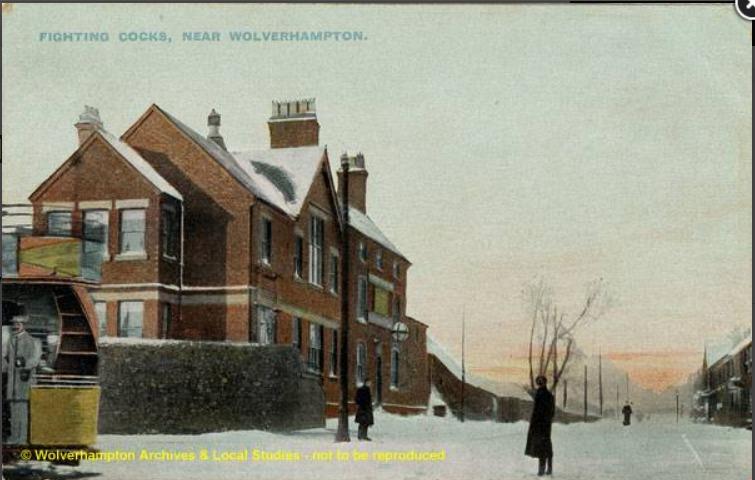
In 1871, Thomas Josiah Tay, his wife Matilda, and their three children Alice, Edward and Maryann, were living in Birmingham. Thomas Josiah was a commercial traveller.
He died on the 16th November 1878 at the age of 62 and was buried in Darlaston, Walsall. On his gravestone:
“Make us glad according to the days wherein thou hast afflicted us, and the years wherein we have seen evil.” Psalm XC 15 verse.
Edward Moore, surgeon, was also a MAGISTRATE in later years. On the 1871 census he states his occupation as “magistrate for counties Worcester and Stafford, and deputy lieutenant of Worcester, formerly surgeon”. He lived at Townsend House in Halesowen for many years. His wifes name was PATTERN Lucas. Her mothers name was Pattern Hewlitt from Birmingham, an unusal name that I have not heard before. On the 1871 census, Edward’s son was a 22 year old solicitor.
In 1861 an article appeared in the newspapers about the state of the morality of the women of Dudley. It was claimed that all the local magistrates agreed with the premise of the article, concerning unmarried women and their attitudes towards having illegitimate children. Letters appeared in subsequent newspapers signed by local magistrates, including Edward Moore, strongly disagreeing.
Staffordshire Advertiser 17 August 1861:
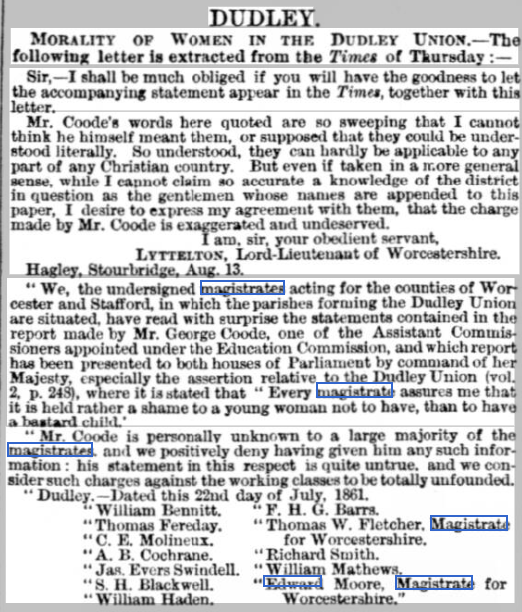 May 12, 2023 at 4:33 pm #7236
May 12, 2023 at 4:33 pm #7236In reply to: Orbs of Madjourneys
Xavier had been back for a month in Berlin, called back for an emergency as his company was announcing a big new venture. The following months had been a whirlwind, and he’d felt a bit guilty leaving his friends just after all the drama and the cart festival, the sand storm and all.
Truth is, the sands of Australia weren’t much to his taste, and he couldn’t dedicate enough of his attention to all the distraction going on. What was Zara saying already? Like trucks in the night? Something like that, they’d gone, all of them their own way. Even AL and the game had stayed silent for while, not sending any new challenges.
It was ironic in a sense, considering his company was all abuzz with AI news, new human interfaces, threat of job loses by the million, data privacy concerns etc. It was already a matter of fact for him, and frankly, he was a bit bored by it now, even though the craze was showing no sign of abating.
“Illusion of depth of knowledge” or rather illusion of explanatory depth — that was was got him to think. All of this automatically generated expressions would be giving huge knowledge at everybody’s fingertips, but with either no willingness to truly understand, or always a nagging doubt it was just a neat narrative that could be completely imagined.
The quest for the elusive spark of creativity was still on. If one thing was sure, it wasn’t to be found in AI.
Suddenly, his phone rang, jolting him out of his daydreams. It was Youssef.
“Hey man, how’s it going?” Xavier asked, pleasantly surprised at the call.
“Listen, I know you’re busy, but we need your help,” Youssef said, his voice urgent. “Yasmin’s gone missing.”
“What do you mean she’s gone missing?”
“We don’t know. We haven’t heard back from her since weeks. Zara’s been trying to reach her, but she’s not answering her phone. We’re all getting worried,” Youssef explained.
Xavier felt a wave of guilt wash over him. He should have been there, should have been helping them search for Yasmin.
There was a silence on the line.
“Look, we had a crazy idea. Can’t your AL or the game give us any clues?” Youssef asked.
“Well, we’ve set boundaries on the system for ethical reasons Youssef. We can’t just spy on people. And who’s to tell she doesn’t just need the space? It wouldn’t have been unheard of. I’m sure she’ll come back in no time, with a smile and a song.”
“I hope so…” Youssef sounded disappointed. “So you won’t help?”
Xavier took a breathe. “Not this time my friend, I’m afraid. But I tell you what. You can go an post an advertisement at the Faded Cabbage pub, in the game’s Old District. Someone who knows someone may be able to help.”
“Thanks for the tip, man… It’s was good to talk to you.” Youssef hanged up.
March 12, 2023 at 6:53 pm #7163In reply to: The Chronicles of the Flying Fish Inn
Aunt Idle
Contention
Endless legal squabbling,
Eventually it comes to blows.
Zhang Ji has a speech defect,
Hair loose, turning northward.I don’t know what the dickens that I Ching is supposed to mean, I was hoping it would give me a clue about that new guest. There’s something about her but I can’t put my finger on it. I must remember to ask Bert about her, see if he’s noticed anything funny. Not that she’s acting funny, not unusual for a guest who’s travelled far to get here ~ and anyone getting here has travelled, let’s face it ~ to stay in their room catching up on sleep, but I don’t know, there is something niggling me about her. I barely caught a glimpse of her but she seemed familiar somehow. I’ll ask Bert, but we’re all so busy now what with the lager and cart race coming up, and those four friends staying, and god only knows when that dust storm comes what we’re supposed to do to entertain them all when they can’t go outside, and they’ll be expecting poor old Finly to keep the place dusted and the windows cleaned. I sometimes think I prefered it here when nobody hardly came.
Hardly got a moment to myself and our Prune is up to something but god knows I don’t have time to follow her around, and there’s no weaseling anything out of her when she’s got one of her secret missions going on. Mater’s pulled her finger out, it has to be said, she’s been as good as gold with the guests, she can turn the old dear charm on when she wants to, and she’s pulled out all the stops playing the gracious hostess, and I can’t say a word against good old Finly. She’s a cheeky minx when we’re not busy but she’s been a real trooper. I think I’ll speak to Mater about a little bonus for her. Yes, I think that might sweeten her up for when I ask her to do my roots tomorrow which reminds me to put pink dye on Berts list for when he goes to Alice in the morning.
Honestly there’s too much to think about, I haven’t had a minute to get a costume ready for the cart race, maybe I’ll ask the twins. Gotta say it, they’ve been brilliant organizing the cart decorating with the four friends. They’re a lovely group, I just wish I had more time to hang out with them, especially the big guy, oh my. Maybe after the cart race, anything can happen after a cart race, lord knows ~ it was after a cart race in a dust storm that Howard and I had a fling and thank god Betsy never found out, she’s have had my guts for garters and nobody would have blamed her. I still wonder what happened to Howard. We always had a soft spot for each other, but he felt so guilty he never strayed from Betsy again. I’d have been game, I’ll be honest, but I didn’t push it. Betsy was a big girl back in those days, but nowhere near as big as she is now. Must be hard for her wondering what happened to her husband all these years, no wonder she got sucked into all that mumbo jumbo and stuffing her chops all day long.
And not being able to claim the inheritance that would have been Howards, that must have been hard. They could have lived in the lap of luxury for the rest of their lives when Howard’s father died, and he hasn’t died yet, must be pushing 90 by now. I know she’s hoping Howard didn’t die in the mines ~ obviously ~ and that he’ll come back one day somehow, and you can bet your bottom dollar she’s hoping he comes back before the old man dies and it all gets left to someone else.
That new guest went in Betsy’s before she even checked in here, Corrie saw her, I guess she’s into mumbo jumbo in a big way if she had to get supplies of crystals or amulets or whatever they sell in there, before checking in to the hotel.
November 13, 2022 at 10:29 pm #6345In reply to: Family Stories From The Other Side ~ Book Two
Crime and Punishment in Tetbury
I noticed that there were quite a number of Brownings of Tetbury in the newspaper archives involved in criminal activities while doing a routine newspaper search to supplement the information in the usual ancestry records. I expanded the tree to include cousins, and offsping of cousins, in order to work out who was who and how, if at all, these individuals related to our Browning family.
I was expecting to find some of our Brownings involved in the Swing Riots in Tetbury in 1830, but did not. Most of our Brownings (including cousins) were stone masons. Most of the rioters in 1830 were agricultural labourers.
The Browning crimes are varied, and by todays standards, not for the most part terribly serious ~ you would be unlikely to receive a sentence of hard labour for being found in an outhouse with the intent to commit an unlawful act nowadays, or for being drunk.
The central character in this chapter is Isaac Browning (my 4x great grandfather), who did not appear in any criminal registers, but the following individuals can be identified in the family structure through their relationship to him.
RICHARD LOCK BROWNING born in 1853 was Isaac’s grandson, his son George’s son. Richard was a mason. In 1879 he and Henry Browning of the same age were sentenced to one month hard labour for stealing two pigeons in Tetbury. Henry Browning was Isaac’s nephews son.
In 1883 Richard Browning, mason of Tetbury, was charged with obtaining food and lodging under false pretences, but was found not guilty and acquitted.
In 1884 Richard Browning, mason of Tetbury, was sentenced to one month hard labour for game trespass.Richard had been fined a number of times in Tetbury:
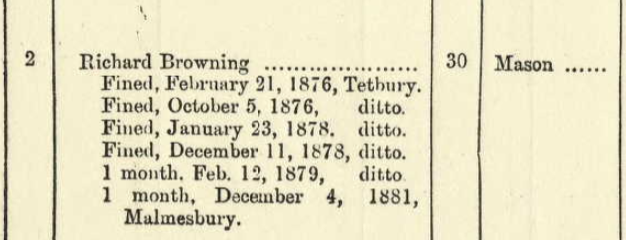
Richard Lock Browning was five feet eight inches tall, dark hair, grey eyes, an oval face and a dark complexion. He had two cuts on the back of his head (in February 1879) and a scar on his right eyebrow.
HENRY BROWNING, who was stealing pigeons with Richard Lock Browning in 1879, (Isaac’s brother Williams grandson, son of George Browning and his wife Charity) was charged with being drunk in 1882 and ordered to pay a fine of one shilling and costs of fourteen shillings, or seven days hard labour.
Henry was found guilty of gaming in the highway at Tetbury in 1872 and was sentenced to seven days hard labour. In 1882 Henry (who was also a mason) was charged with assault but discharged.
Henry was five feet five inches tall, brown hair and brown eyes, a long visage and a fresh complexion.
Henry emigrated with his daughter to Canada in 1913, and died in Vancouver in 1919.THOMAS BUCKINGHAM 1808-1846 (Isaacs daughter Janes husband) was charged with stealing a black gelding in Tetbury in 1838. No true bill. (A “no true bill” means the jury did not find probable cause to continue a case.)
Thomas did however neglect to pay his taxes in 1832:
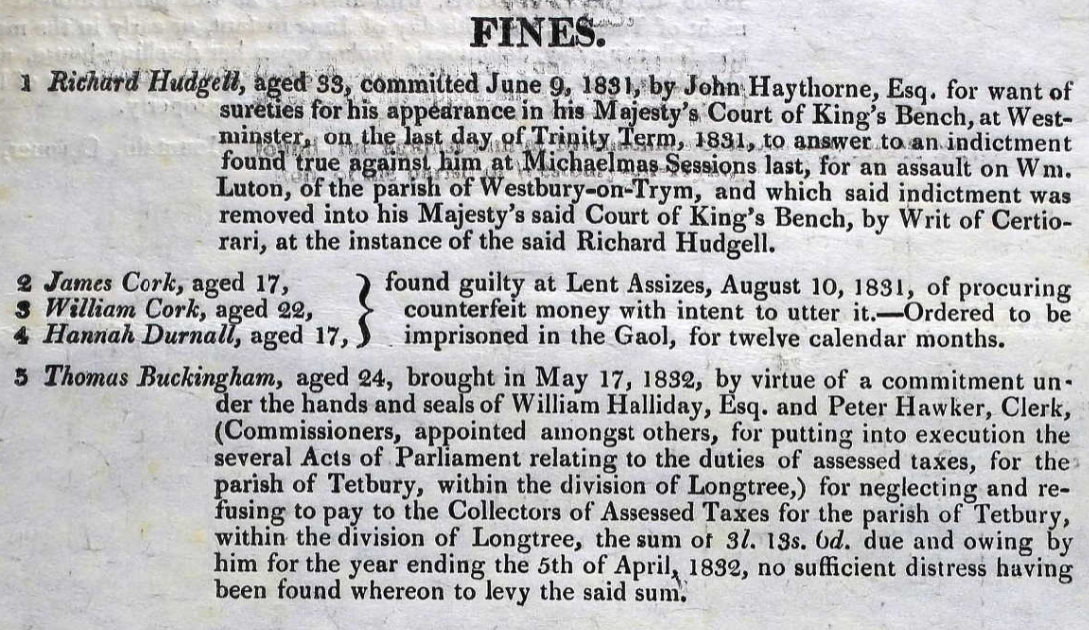
LEWIN BUCKINGHAM (grandson of Isaac, his daughter Jane’s son) was found guilty in 1846 stealing two fowls in Tetbury when he was sixteen years old.
In 1846 he was sentence to one month hard labour (or pay ten shillings fine and ten shillings costs) for loitering with the intent to trespass in search of conies.
A year later in 1847, he and three other young men were sentenced to four months hard labour for larceny.
Lewin was five feet three inches tall, with brown hair and brown eyes, long visage, sallow complexion, and had a scar on his left arm.JOHN BUCKINGHAM born circa 1832, a Tetbury labourer (Isaac’s grandson, Lewin’s brother) was sentenced to six weeks hard labour for larceny in 1855 for stealing a duck in Cirencester. The notes on the register mention that he had been employed by Mr LOCK, Angel Inn. (John’s grandmother was Mary Lock so this is likely a relative).

The previous year in 1854 John was sentenced to one month or a one pound fine for assaulting and beating W. Wood.
John was five feet eight and three quarter inches tall, light brown hair and grey eyes, an oval visage and a fresh complexion. He had a scar on his left arm and inside his right knee.JOSEPH PERRET was born circa 1831 and he was a Tetbury labourer. (He was Isaac’s granddaughter Charlotte Buckingham’s husband)
In 1855 he assaulted William Wood and was sentenced to one month or a two pound ten shilling fine. Was it the same W Wood that his wifes cousin John assaulted the year before?
In 1869 Joseph was sentenced to one month hard labour for feloniously receiving a cupboard known to be stolen.JAMES BUCKINGAM born circa 1822 in Tetbury was a shoemaker. (Isaac’s nephew, his sister Hannah’s son)
In 1854 the Tetbury shoemaker was sentenced to four months hard labour for stealing 30 lbs of lead off someones house.
In 1856 the Tetbury shoemaker received two months hard labour or pay £2 fine and 12 s costs for being found in pursuit of game.
In 1868 he was sentenced to two months hard labour for stealing a gander. A unspecified previous conviction is noted.
1871 the Tetbury shoemaker was found in an outhouse for an unlawful purpose and received ten days hard labour. The register notes that his sister is Mrs Cook, the Green, Tetbury. (James sister Prudence married Thomas Cook)
James sister Charlotte married a shoemaker and moved to UTAH.
James was five feet eight inches tall, dark hair and blue eyes, a long visage and a florid complexion. He had a scar on his forehead and a mole on the right side of his neck and abdomen, and a scar on the right knee.November 4, 2022 at 2:19 pm #6342In reply to: Family Stories From The Other Side ~ Book Two
Brownings of Tetbury
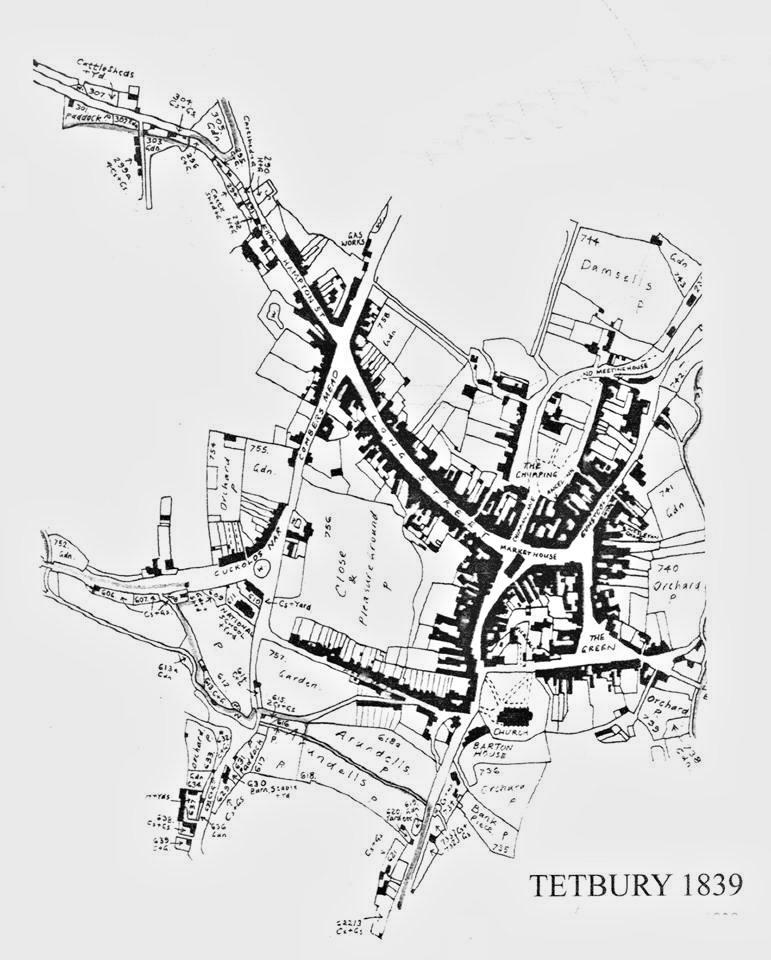
Isaac Browning (1784-1848) married Mary Lock (1787-1870) in Tetbury in 1806. Both of them were born in Tetbury, Gloucestershire. Isaac was a stone mason. Between 1807 and 1832 they baptised fourteen children in Tetbury, and on 8 Nov 1829 Isaac and Mary baptised five daughters all on the same day.
I considered that they may have been quintuplets, with only the last born surviving, which would have answered my question about the name of the house La Quinta in Broadway, the home of Eliza Browning and Thomas Stokes son Fred. However, the other four daughters were found in various records and they were not all born the same year. (So I still don’t know why the house in Broadway had such an unusual name).
Their son George was born and baptised in 1827, but Louisa born 1821, Susan born 1822, Hesther born 1823 and Mary born 1826, were not baptised until 1829 along with Charlotte born in 1828. (These birth dates are guesswork based on the age on later censuses.) Perhaps George was baptised promptly because he was sickly and not expected to survive. Isaac and Mary had a son George born in 1814 who died in 1823. Presumably the five girls were healthy and could wait to be done as a job lot on the same day later.
Eliza Browning (1814-1886), my great great great grandmother, had a baby six years before she married Thomas Stokes. Her name was Ellen Harding Browning, which suggests that her fathers name was Harding. On the 1841 census seven year old Ellen was living with her grandfather Isaac Browning in Tetbury. Ellen Harding Browning married William Dee in Tetbury in 1857, and they moved to Western Australia.
Ellen Harding Browning Dee: (photo found on ancestry website)
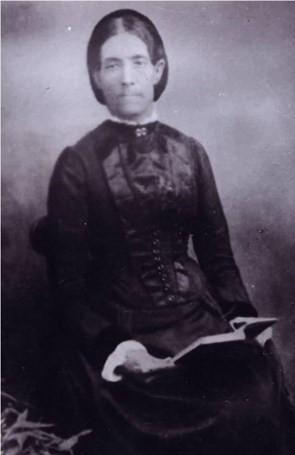
OBITUARY. MRS. ELLEN DEE.
A very old and respected resident of Dongarra, in the person of Mrs. Ellen Dee, passed peacefully away on Sept. 27, at the advanced age of 74 years.The deceased had been ailing for some time, but was about and actively employed until Wednesday, Sept. 20, whenn she was heard groaning by some neighbours, who immediately entered her place and found her lying beside the fireplace. Tho deceased had been to bed over night, and had evidently been in the act of lighting thc fire, when she had a seizure. For some hours she was conscious, but had lost the power of speech, and later on became unconscious, in which state she remained until her death.
The deceased was born in Gloucestershire, England, in 1833, was married to William Dee in Tetbury Church 23 years later. Within a month she left England with her husband for Western Australian in the ship City oí Bristol. She resided in Fremantle for six months, then in Greenough for a short time, and afterwards (for 42 years) in Dongarra. She was, therefore, a colonist of about 51 years. She had a family of four girls and three boys, and five of her children survive her, also 35 grandchildren, and eight great grandchildren. She was very highly respected, and her sudden collapse came as a great shock to many.
Eliza married Thomas Stokes (1816-1885) in September 1840 in Hempstead, Gloucestershire. On the 1841 census, Eliza and her mother Mary Browning (nee Lock) were staying with Thomas Lock and family in Cirencester. Strangely, Thomas Stokes has not been found thus far on the 1841 census, and Thomas and Eliza’s first child William James Stokes birth was registered in Witham, in Essex, on the 6th of September 1841.
I don’t know why William James was born in Witham, or where Thomas was at the time of the census in 1841. One possibility is that as Thomas Stokes did a considerable amount of work with circus waggons, circus shooting galleries and so on as a journeyman carpenter initially and then later wheelwright, perhaps he was working with a traveling circus at the time.
But back to the Brownings ~ more on William James Stokes to follow.
One of Isaac and Mary’s fourteen children died in infancy: Ann was baptised and died in 1811. Two of their children died at nine years old: the first George, and Mary who died in 1835. Matilda was 21 years old when she died in 1844.
Jane Browning (1808-) married Thomas Buckingham in 1830 in Tetbury. In August 1838 Thomas was charged with feloniously stealing a black gelding.
Susan Browning (1822-1879) married William Cleaver in November 1844 in Tetbury. Oddly thereafter they use the name Bowman on the census. On the 1851 census Mary Browning (Susan’s mother), widow, has grandson George Bowman born in 1844 living with her. The confusion with the Bowman and Cleaver names was clarified upon finding the criminal registers:
30 January 1834. Offender: William Cleaver alias Bowman, Richard Bunting alias Barnfield and Jeremiah Cox, labourers of Tetbury. Crime: Stealing part of a dead fence from a rick barton in Tetbury, the property of Robert Tanner, farmer.
And again in 1836:
29 March 1836 Bowman, William alias Cleaver, of Tetbury, labourer age 18; 5’2.5” tall, brown hair, grey eyes, round visage with fresh complexion; several moles on left cheek, mole on right breast. Charged on the oath of Ann Washbourn & others that on the morning of the 31 March at Tetbury feloniously stolen a lead spout affixed to the dwelling of the said Ann Washbourn, her property. Found guilty 31 March 1836; Sentenced to 6 months.
On the 1851 census Susan Bowman was a servant living in at a large drapery shop in Cheltenham. She was listed as 29 years old, married and born in Tetbury, so although it was unusual for a married woman not to be living with her husband, (or her son for that matter, who was living with his grandmother Mary Browning), perhaps her husband William Bowman alias Cleaver was in trouble again. By 1861 they are both living together in Tetbury: William was a plasterer, and they had three year old Isaac and Thomas, one year old. In 1871 William was still a plasterer in Tetbury, living with wife Susan, and sons Isaac and Thomas. Interestingly, a William Cleaver is living next door but one!
Susan was 56 when she died in Tetbury in 1879.
Three of the Browning daughters went to London.
Louisa Browning (1821-1873) married Robert Claxton, coachman, in 1848 in Bryanston Square, Westminster, London. Ester Browning was a witness.
Ester Browning (1823-1893)(or Hester) married Charles Hudson Sealey, cabinet maker, in Bethnal Green, London, in 1854. Charles was born in Tetbury. Charlotte Browning was a witness.
Charlotte Browning (1828-1867?) was admitted to St Marylebone workhouse in London for “parturition”, or childbirth, in 1860. She was 33 years old. A birth was registered for a Charlotte Browning, no mothers maiden name listed, in 1860 in Marylebone. A death was registered in Camden, buried in Marylebone, for a Charlotte Browning in 1867 but no age was recorded. As the age and parents were usually recorded for a childs death, I assume this was Charlotte the mother.
I found Charlotte on the 1851 census by chance while researching her mother Mary Lock’s siblings. Hesther Lock married Lewin Chandler, and they were living in Stepney, London. Charlotte is listed as a neice. Although Browning is mistranscribed as Broomey, the original page says Browning. Another mistranscription on this record is Hesthers birthplace which is transcribed as Yorkshire. The original image shows Gloucestershire.
Isaac and Mary’s first son was John Browning (1807-1860). John married Hannah Coates in 1834. John’s brother Charles Browning (1819-1853) married Eliza Coates in 1842. Perhaps they were sisters. On the 1861 census Hannah Browning, John’s wife, was a visitor in the Harding household in a village called Coates near Tetbury. Thomas Harding born in 1801 was the head of the household. Perhaps he was the father of Ellen Harding Browning.
George Browning (1828-1870) married Louisa Gainey in Tetbury, and died in Tetbury at the age of 42. Their son Richard Lock Browning, a 32 year old mason, was sentenced to one month hard labour for game tresspass in Tetbury in 1884.
Isaac Browning (1832-1857) was the youngest son of Isaac and Mary. He was just 25 years old when he died in Tetbury.
October 23, 2022 at 6:57 am #6340In reply to: Family Stories From The Other Side ~ Book Two
Wheelwrights of Broadway
Thomas Stokes 1816-1885
Frederick Stokes 1845-1917
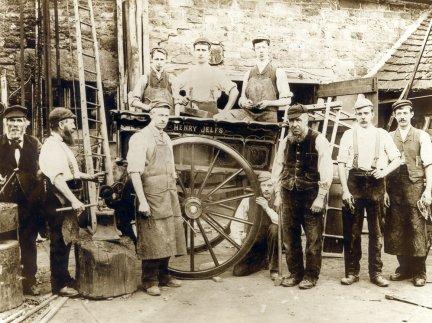
Stokes Wheelwrights. Fred on left of wheel, Thomas his father on right.
Thomas Stokes
Thomas Stokes was born in Bicester, Oxfordshire in 1816. He married Eliza Browning (born in 1814 in Tetbury, Gloucestershire) in Gloucester in 1840 Q3. Their first son William was baptised in Chipping Hill, Witham, Essex, on 3 Oct 1841. This seems a little unusual, and I can’t find Thomas and Eliza on the 1841 census. However both the 1851 and 1861 census state that William was indeed born in Essex.
In 1851 Thomas and Eliza were living in Bledington, Gloucestershire, and Thomas was a journeyman carpenter.
Note that a journeyman does not mean someone who moved around a lot. A journeyman was a tradesman who had served his trade apprenticeship and mastered his craft, not bound to serve a master, but originally hired by the day. The name derives from the French for day – jour.
Also on the 1851 census: their daughter Susan, born in Churchill Oxfordshire in 1844; son Frederick born in Bledington Gloucestershire in 1846; daughter Louisa born in Foxcote Oxfordshire in 1849; and 2 month old daughter Harriet born in Bledington in 1851.
On the 1861 census Thomas and Eliza were living in Evesham, Worcestershire, and daughter Susan was no longer living at home, but William, Fred, Louisa and Harriet were, as well as daughter Emily born in Churchill Oxfordshire in 1856. Thomas was a wheelwright.
On the 1871 census Thomas and Eliza were still living in Evesham, and Thomas was a wheelwright employing three apprentices. Son Fred, also a wheelwright, and his wife Ann Rebecca live with them.
Mr Stokes, wheelwright, was found guilty of reprehensible conduct in concealing the fact that small-pox existed in his house, according to a mention in The Oxfordshire Weekly News on Wednesday 19 February 1873:
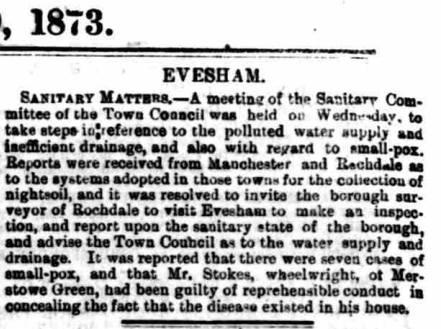
From Paul Weaver’s ancestry website:
“It was Thomas Stokes who built the first “Famous Vale of Evesham Light Gardening Dray for a Half-Legged Horse to Trot” (the quotation is from his account book), the forerunner of many that became so familiar a sight in the towns and villages from the 1860s onwards. He built many more for the use of the Vale gardeners.
Thomas also had long-standing business dealings with the people of the circus and fairgrounds, and had a contract to effect necessary repairs and renewals to their waggons whenever they visited the district. He built living waggons for many of the show people’s families as well as shooting galleries and other equipment peculiar to the trade of his wandering customers, and among the names figuring in his books are some still familiar today, such as Wilsons and Chipperfields.
He is also credited with inventing the wooden “Mushroom” which was used by housewives for many years to darn socks. He built and repaired all kinds of vehicles for the gentry as well as for the circus and fairground travellers.
Later he lived with his wife at Merstow Green, Evesham, in a house adjoining the Almonry.”
An excerpt from the book Evesham Inns and Signs by T.J.S. Baylis:

The Old Red Horse, Evesham:
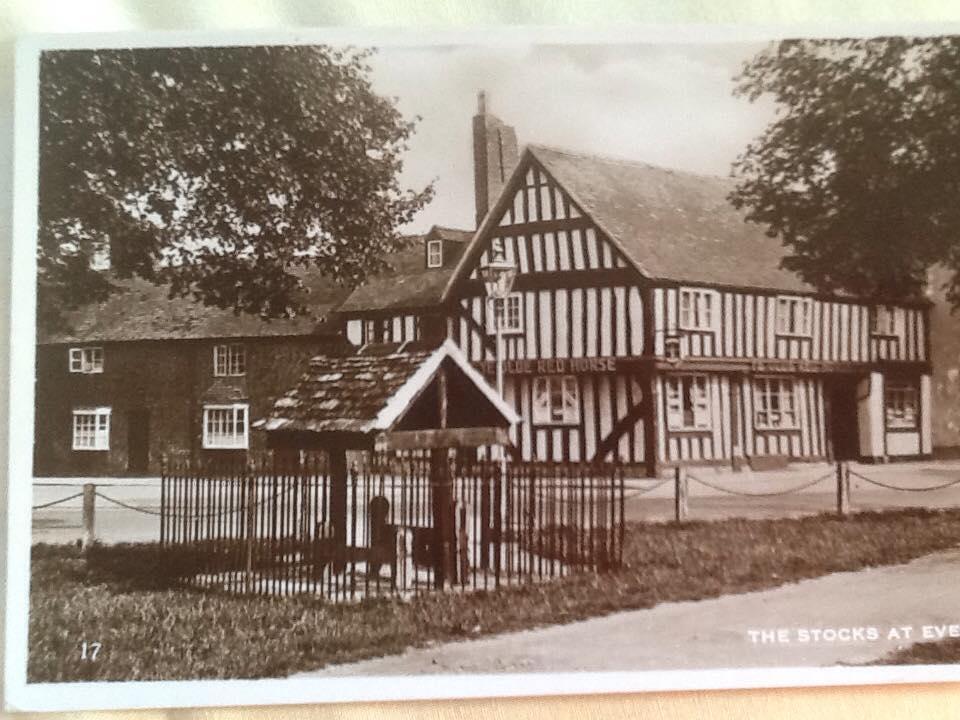
Thomas died in 1885 aged 68 of paralysis, bronchitis and debility. His wife Eliza a year later in 1886.
Frederick Stokes
In Worcester in 1870 Fred married Ann Rebecca Day, who was born in Evesham in 1845.
Ann Rebecca Day:
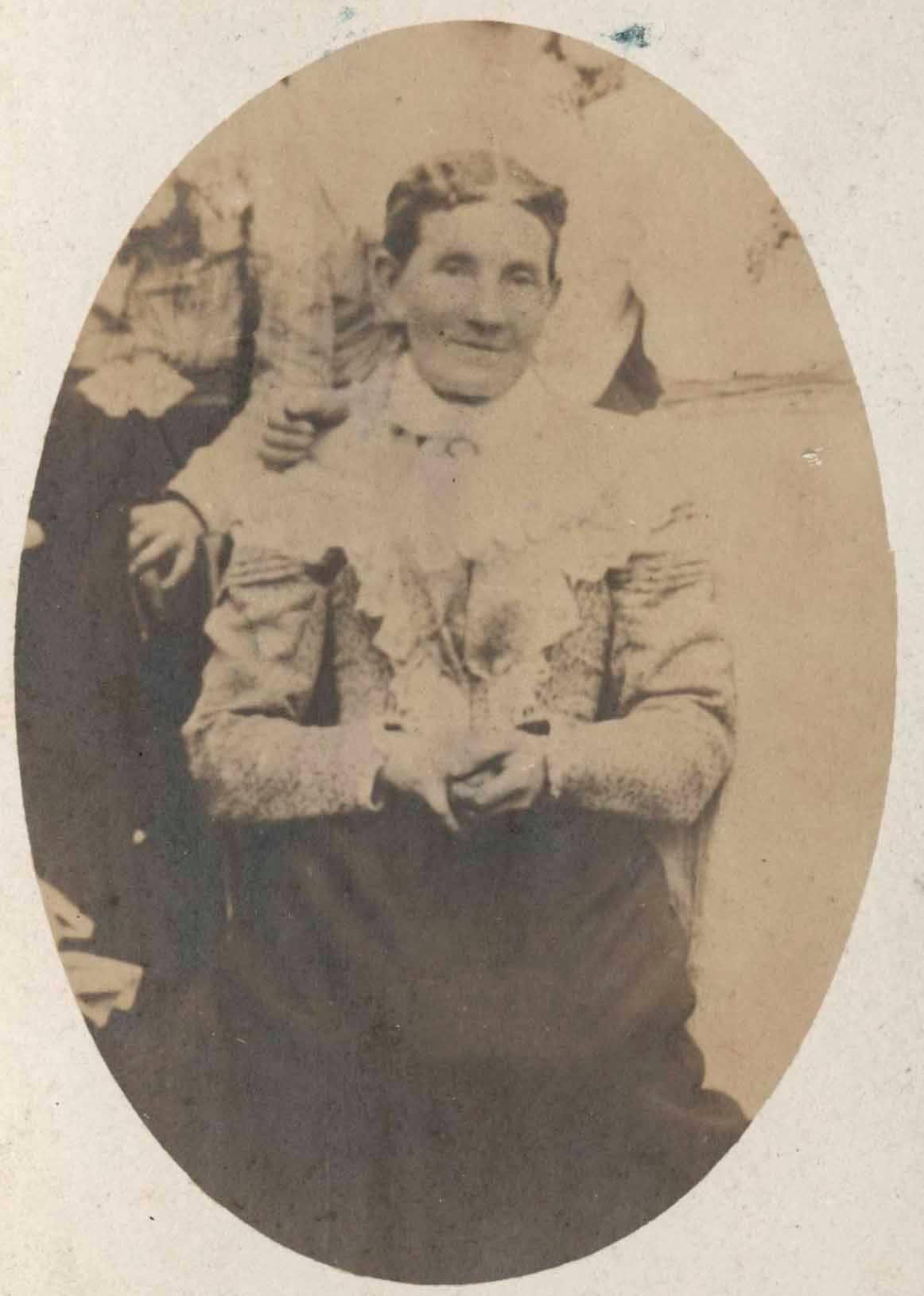
In 1871 Fred was still living with his parents in Evesham, with his wife Ann Rebecca as well as their three month old daughter Annie Elizabeth. Fred and Ann (referred to as Rebecca) moved to La Quinta on Main Street, Broadway.
Rebecca Stokes in the doorway of La Quinta on Main Street Broadway, with her grandchildren Ralph and Dolly Edwards:
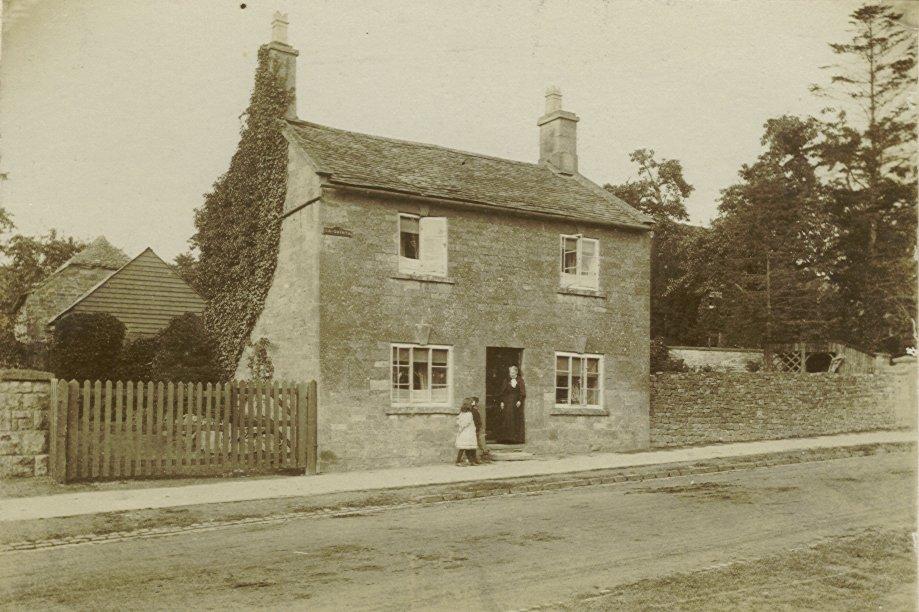
Fred was a wheelwright employing one man on the 1881 census. In 1891 they were still in Broadway, Fred’s occupation was wheelwright and coach painter, as well as his fifteen year old son Frederick.
In the Evesham Journal on Saturday 10 December 1892 it was reported that “Two cases of scarlet fever, the children of Mr. Stokes, wheelwright, Broadway, were certified by Mr. C. W. Morris to be isolated.”
Still in Broadway in 1901 and Fred’s son Albert was also a wheelwright. By 1911 Fred and Rebecca had only one son living at home in Broadway, Reginald, who was a coach painter. Fred was still a wheelwright aged 65.
Fred’s signature on the 1911 census:

Rebecca died in 1912 and Fred in 1917.
Fred Stokes:
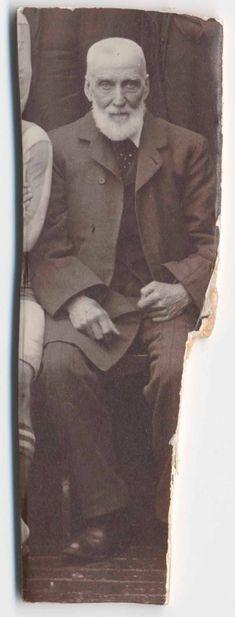
In the book Evesham to Bredon From Old Photographs By Fred Archer:
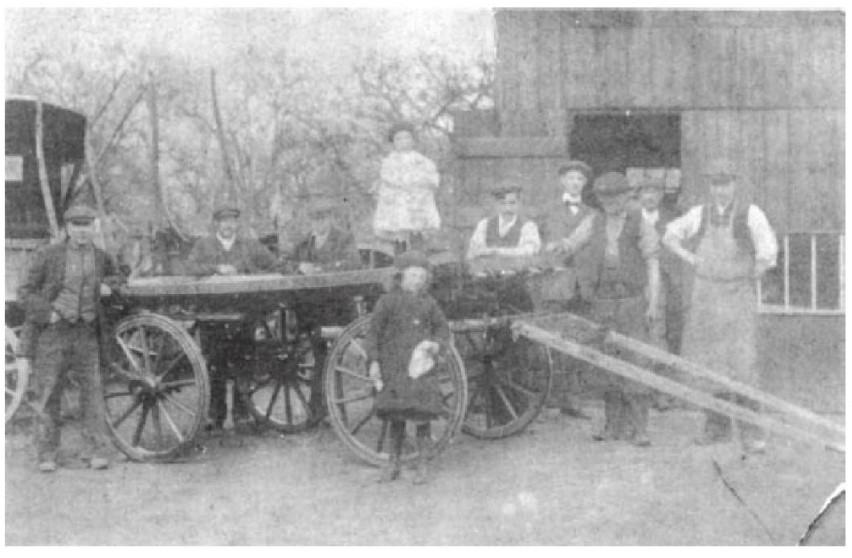
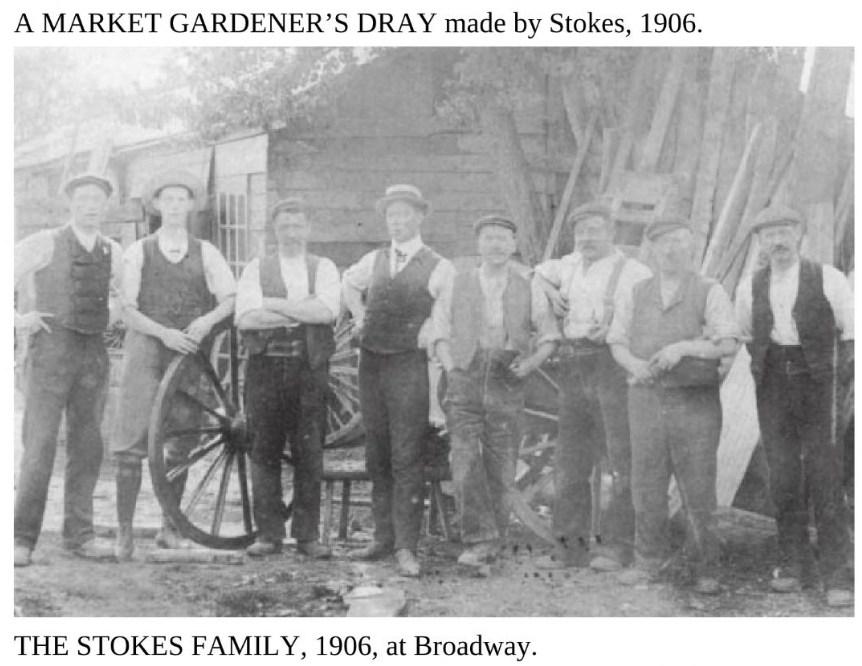 February 8, 2022 at 2:24 pm #6275
February 8, 2022 at 2:24 pm #6275In reply to: The Elusive Samuel Housley and Other Family Stories
“AND NOW ABOUT EMMA”
and a mystery about George
I had overlooked this interesting part of Barbara Housley’s “Narrative on the Letters” initially, perhaps because I was more focused on finding Samuel Housley. But when I did eventually notice, I wondered how I had missed it! In this particularly interesting letter excerpt from Joseph, Barbara has not put the date of the letter ~ unusually, because she did with all of the others. However I dated the letter to later than 1867, because Joseph mentions his wife, and they married in 1867. This is important, because there are two Emma Housleys. Joseph had a sister Emma, born in 1836, two years before Joseph was born. At first glance, one would assume that a reference to Emma in the letters would mean his sister, but Emma the sister was married in Derby in 1858, and by 1869 had four children.
But there was another Emma Housley, born in 1851.
From Barbara Housley’s Narrative on the Letters:
“AND NOW ABOUT EMMA”
A MYSTERY
A very mysterious comment is contained in a letter from Joseph:
“And now about Emma. I have only seen her once and she came to me to get your address but I did not feel at liberty to give it to her until I had wrote to you but however she got it from someone. I think it was in this way. I was so pleased to hear from you in the first place and with John’s family coming to see me I let them read one or two of your letters thinking they would like to hear of you and I expect it was Will that noticed your address and gave it to her. She came up to our house one day when I was at work to know if I had heard from you but I had not heard from you since I saw her myself and then she called again after that and my wife showed her your boys’ portraits thinking no harm in doing so.”
At this point Joseph interrupted himself to thank them for sending the portraits. The next sentence is:
“Your son JOHN I have never seen to know him but I hear he is rather wild,” followed by: “EMMA has been living out service but don’t know where she is now.”
Since Joseph had just been talking about the portraits of George’s three sons, one of whom is John Eley, this could be a reference to things George has written in despair about a teen age son–but could Emma be a first wife and John their son? Or could Emma and John both be the children of a first wife?
Elsewhere, Joseph wrote, “AMY ELEY died 14 years ago. (circa 1858) She left a son and a daughter.”
An Amey Eley and a George Housley were married on April 1, 1849 in Duffield which is about as far west of Smalley as Heanor is East. She was the daughter of John, a framework knitter, and Sarah Eley. George’s father is listed as William, a farmer. Amey was described as “of full age” and made her mark on the marriage document.
Anne wrote in August 1854: “JOHN ELEY is living at Derby Station so must take the first opportunity to get the receipt.” Was John Eley Housley named for him?
(John Eley Housley is George Housley’s son in USA, with his second wife, Sarah.)
George Housley married Amey Eley in 1849 in Duffield. George’s father on the register is William Housley, farmer. Amey Eley’s father is John Eley, framework knitter.

On the 1851 census, George Housley and his wife Amey Housley are living with her parents in Heanor, John Eley, a framework knitter, and his wife Rebecca. Also on the census are Charles J Housley, born in 1849 in Heanor, and Emma Housley, three months old at the time of the census, born in 1851. George’s birth place is listed as Smalley.

On the 31st of July 1851 George Housley arrives in New York. In 1854 George Housley marries Sarah Ann Hill in USA.
On the 1861 census in Heanor, Rebecca Eley was a widow, her husband John having died in 1852, and she had three grandchildren living with her: Charles J Housley aged 12, Emma Housley, 10, and mysteriously a William Housley aged 5! Amey Housley, the childrens mother, died in 1858.

Back to the mysterious comment in Joseph’s letter. Joseph couldn’t have been speaking of his sister Emma. She was married with children by the time Joseph wrote that letter, so was not just out of service, and Joseph would have known where she was. There is no reason to suppose that the sister Emma was trying unsuccessfully to find George’s addresss: she had been sending him letters for years. Joseph must have been referring to George’s daughter Emma.
Joseph comments to George “Your son John…is rather wild.” followed by the remark about Emma’s whereabouts. Could Charles John Housley have used his middle name of John instead of Charles?
As for the child William born five years after George left for USA, despite his name of Housley, which was his mothers married name, we can assume that he was not a Housley ~ not George’s child, anyway. It is not clear who his father was, as Amey did not remarry.
A further excerpt from Barbara Housley’s Narrative on the Letters:
Certainly there was some mystery in George’s life. George apparently wanted his whereabouts kept secret. Anne wrote: “People are at a loss to know where you are. The general idea is you are with Charles. We don’t satisfy them.” In that same letter Anne wrote: “I know you could not help thinking of us very often although you neglected writing…and no doubt would feel grieved for the trouble you at times caused (our mother). She freely forgives all.” Near the end of the letter, Anne added: “Mother sends her love to you and hopes you will write and if you want to tell her anything you don’t want all to see you must write it on a piece of loose paper and put it inside the letter.”
In a letter to George from his sister Emma:
Emma wrote in 1855, “We write in love to your wife and yourself and you must write soon and tell us whether there is a little nephew or niece and what you call them.”
In June of 1856, Emma wrote: “We want to see dear Sarah Ann and the dear little boy. We were much pleased with the “bit of news” you sent.” The bit of news was the birth of John Eley Housley, January 11, 1855. Emma concluded her letter “Give our very kindest love to dear sister and dearest Johnnie.”
It would seem that George Housley named his first son with his second wife after his first wife’s father ~ while he was married to both of them.
Emma Housley
1851-1935
In 1871 Emma was 20 years old and “in service” living as a lodger in West Hallam, not far from Heanor. As she didn’t appear on a 1881 census, I looked for a marriage, but the only one that seemed right in every other way had Emma Housley’s father registered as Ralph Wibberly!
Who was Ralph Wibberly? A family friend or neighbour, perhaps, someone who had been a father figure? The first Ralph Wibberly I found was a blind wood cutter living in Derby. He had a son also called Ralph Wibberly. I did not think Ralph Wibberly would be a very common name, but I was wrong.
I then found a Ralph Wibberly living in Heanor, with a son also named Ralph Wibberly. A Ralph Wibberly married an Emma Salt from Heanor. In 1874, a 36 year old Ralph Wibberly (born in 1838) was on trial in Derby for inflicting grevious bodily harm on William Fretwell of Heanor. His occupation is “platelayer” (a person employed in laying and maintaining railway track.) The jury found him not guilty.
In 1851 a 23 year old Ralph Wibberly (born in 1828) was a prisoner in Derby Gaol. However, Ralph Wibberly, a 50 year old labourer born in 1801 and his son Ralph Wibberly, aged 13 and born in 1838, are living in Belper on the 1851 census. Perhaps the son was the same Ralph Wibberly who was found not guilty of GBH in 1874. This appears to be the one who married Emma Salt, as his wife on the 1871 census is called Emma, and his occupation is “Midland Company Railway labourer”.
Which was the Ralph Wibberly that Emma chose to name as her father on the marriage register? We may never know, but perhaps we can assume it was Ralph Wibberly born in 1801. It is unlikely to be the blind wood cutter from Derby; more likely to be the local Ralph Wibberly. Maybe his son Ralph, who we know was involved in a fight in 1874, was a friend of Emma’s brother Charles John, who was described by Joseph as a “wild one”, although Ralph was 11 years older than Charles John.
Emma Housley married James Slater on Christmas day in Heanor in 1873. Their first child, a daughter, was called Amy. Emma’s mother was Amy Eley. James Slater was a colliery brakesman (employed to work the steam-engine, or other machinery used in raising the coal from the mine.)
It occurred to me to wonder if Emma Housley (George’s daughter) knew Elizabeth, Mary Anne and Catherine (Samuel’s daughters). They were cousins, lived in the vicinity, and they had in common with each other having been deserted by their fathers who were brothers. Emma was born two years after Catherine. Catherine was living with John Benniston, a framework knitter in Heanor, from 1851 to 1861. Emma was living with her grandfather John Ely, a framework knitter in Heanor. In 1861, George Purdy was also living in Heanor. He was listed on the census as a 13 year old coal miner! George Purdy and Catherine Housley married in 1866 in Eastwood, Nottinghamshire ~ just over the county border. Emma’s first child Amy was born in Heanor, but the next two children, Eliza and Lilly, were born in Eastwood, in 1878 and 1880. Catherine and George’s fifth child, my great grandmother Mary Ann Gilman Purdy, was born in Eastwood in 1880, the same year as Lilly Slater.
By 1881 Emma and James Slater were living in Woodlinkin, Codnor and Loscoe, close to Heanor and Eastwood, on the Derbyshire side of the border. On each census up to 1911 their address on the census is Woodlinkin. Emma and James had nine children: six girls and 3 boys, the last, Alfred Frederick, born in 1901.
Emma and James lived three doors up from the Thorn Tree pub in Woodlinkin, Codnor:

Emma Slater died in 1935 at the age of 84.
IN
LOVING MEMORY OF
EMMA SLATER
(OF WOODLINKIN)
WHO DIED
SEPT 12th 1935
AGED 84 YEARS
AT RESTCrosshill Cemetery, Codnor, Amber Valley Borough, Derbyshire, England:

Charles John Housley
1949-
December 18, 2021 at 7:05 pm #6246In reply to: The Elusive Samuel Housley and Other Family Stories
Florence Nightingale Gretton
1881-1927
Florence’s father was Richard Gretton, a baker in Swadlincote, Derbyshire. When Richard married Sarah Orgill in 1861, they lived with her mother, a widow, in Measham, Ashby de la Zouch in Leicestershire. On the 1861 census Sarah’s mother, Elizabeth, is a farmer of two acres.
(Swadlincote and Ashby de la Zouch are on the Derbyshire Leicestershire border and not far from each other. Swadlincote is near to Burton upon Trent which is sometimes in Staffordshire, sometimes in Derbyshire. Newhall, Church Gresley, and Swadlincote are all very close to each other or districts in the same town.)
Ten years later in 1871 Richard and Sarah have their own place in Swadlincote, he is a baker, and they have four children. A fourteen year old apprentice or servant is living with them.
In the Ashby-de-la-Zouch Gazette on 28 February 1880, it was reported that Richard Gretton, baker, of Swadlincote, was charged by Captain Bandys with carrying bread in a cart for sale, the said cart not being provided with scales and weights, according to the requirements of the Act, on the 17th January last.—Defendant pleaded guilty, but urged in extenuation of the offence that in the hurry he had forgotten to put the scales in the cart before his son started.—The Bench took this view of the case, regarding it as an oversight, and fined him one shilling only and costs. This was not his only offence.
In 1883, he was fined twenty shillings, and ten shillings and sixpence costs.

By 1881 they have 4 more children, and Florence Nightingale is the youngest at four months. Richard is 48 by now, and Sarah is 44. Florence’s older brother William is a blacksmith.
Interestingly on the same census page, two doors down Thomas and Selina Warren live at the Stanhope Arms. Richards son John Gretton lives at the pub, a 13 year old servant. Incidentally, I noticed on Thomas and Selena’s marriage register that Richard and Sarah Gretton were the witnesses at the wedding.
Ten years later in 1891, Florence Nightingale and her sister Clara are living with Selina Warren, widow, retired innkeeper, one door down from the Stanhope Arms. Florence is ten, Clara twelve and they are scholars.
Richard and Sarah are still living three doors up on the other side of the Stanhope Arms, with three of their sons. But the two girls lived up the road with the Warren widow!The Stanhope Arms, Swadlincote: it’s possible that the shop with the awning was Richard Gretton’s bakers shop (although not at the time of this later photo).

Richard died in 1898, a year before Florence married Samuel Warren.
Sarah is a widowed 60 year old baker on the 1901 census. Her son 26 year old son Alf, also a baker, lives at the same address, as does her 22 year old daughter Clara who is a district nurse.
Clara Gretton and family, photo found online:

In 1901 Florence Nightingale (who we don’t have a photograph of!) is now married and is Florrie Warren on the census, and she, her husband Samuel, and their one year old daughter Hildred are visitors at the address of Elizabeth (Staley)Warren, 60 year old widow and Samuel’s mother, and Samuel’s 36 year old brother William. Samuel and William are engineers.
Samuel and Florrie had ten children between 1900 and 1925 (and all but two of them used their middle name and not first name: my mother and I had no idea until I found all the records. My grandmother Florence Noreen was known as Nora, which we knew of course, uncle Jack was actually Douglas John, and so on).
Hildred, Clara, Billy, and Nora were born in Swadlincote. Sometime between my grandmother’s birth in 1907 and Kay’s birth in 1911, the family moved to Oldswinford, in Stourbridge. Later they moved to Market Street.
1911 census, Oldswinford, Stourbridge:

Oddly, nobody knew when Florrie Warren died. My mothers cousin Ian Warren researched the Warren family some years ago, while my grandmother was still alive. She contributed family stories and information, but couldn’t remember if her mother died in 1929 or 1927. A recent search of records confirmed that it was the 12th November 1927.
She was 46 years old. We were curious to know how she died, so my mother ordered a paper copy of her death certificate. It said she died at 31 Market Street, Stourbridge at the age of 47. Clara May Warren, her daughter, was in attendance. Her husband Samuel Warren was a motor mechanic. The Post mortem was by Percival Evans, coroner for Worcestershire, who clarified the cause of death as vascular disease of the heart. There was no inquest. The death was registered on 15 Nov 1927.
I looked for a photo of 31 Market Street in Stourbridge, and was astonished to see that it was the house next door to one I lived in breifly in the 1980s. We didn’t know that the Warren’s lived in Market Street until we started searching the records.
Market Street, Stourbridge. I lived in the one on the corner on the far right, my great grandmother died in the one next door.

I found some hitherto unknown emigrants in the family. Florence Nightingale Grettons eldest brother William 1861-1940 stayed in Swadlincote. John Orgill Gretton born in 1868 moved to Trenton New Jersey USA in 1888, married in 1892 and died in 1949 in USA. Michael Thomas born in 1870 married in New York in 1893 and died in Trenton in 1940. Alfred born 1875 stayed in Swadlincote. Charles Herbert born 1876 married locally and then moved to Australia in 1912, and died in Victoria in 1954. Clara Elizabeth was a district nurse, married locally and died at the age of 99.
October 21, 2020 at 9:23 am #6142In reply to: The Whale’s Diaries Collection
Everyone seems happy about the rain, and I don’t blame them. I’m not daft, I know we need rain but it’s not so easy when you don’t have a home. But I am nothing if not stalwart and stoic, resourceful and adaptable, and I found a good way to keep warm and dry during the downpours. It’s amazing how much heat an animal gives off, so I camp down in stables or kennels when it’s cold and wet. It can get a bit smelly, but it’s warm and dry and when my clothes are damp and stinking I just throw them all away and get some new ones out of the recycling bins. Just to clarify, I find the new clothes first before throwing the ones I’m wearing away. I’m not daft, I know walking around naked would catch attention and I try to stay under the radar. Nobody really notices smelly old ladies wandering around these days anyway, but naked would be another matter.
There’s a stable I really like just outside of town, lots of nice deep clean straw. There’s a white horse in there that knows me now and the gentle whicker of recognition when she sees me warms my heart. I don’t stay there any two nights running though. One thing I’ve learned is don’t do anything too regular, keep it random and varied. I don’t want anyone plotting my movements and interfering with me in any way.
There’s not much to do in a stable when it rains for days and nights on end but remember things, so I may as well write them down. I’m never quite sure if the things I remember are my memories or someone elses, a past life of my own perhaps, or another person entirely. I used to worry a bit about that, but not anymore. Nobody cares and there’s nobody to flag my memories as false, and if there was, I wouldn’t care if they did.
Anyway, the other day while I was nestled in a pile of sweet hay listening to the thunder, I recalled that day when someone offered me a fortune for that old mirror I’d bought at the flea market. I know I hadn’t paid much for it, because I never did pay much for anything. Never have done. I bought it because it was unusual (hideous is what everyone said about it, but people have got very strangely ordinary taste, I’ve found) and because it was cheap enough that I could buy it without over thinking the whole thing. At the end of the day you can’t beat the magic of spontaneity, it out performs long winded assessment every time.
So this man was a friend of a friend who happened to visit and made me an offer I couldn’t refuse so of course I sold the mirror to him. He was so delighted about it that I’d have given him the mirror for nothing if I knew he wanted it that much, but I’m not daft, I took the money. I found out later that he’d won the lottery, so I never felt guilty about it.
Well, after he’d gone I sat there looking at this pile of money in my hands and knew exactly what I was going to do. But first I had to find them. They’d moved again and we’d lost contact but I knew I’d find a way. And I did. They’d given up all hope of ever getting that money back that I’d borrowed, but they said the timing was perfect, couldn’t have been better, they said. It wouldn’t have meant all that much to them if I’d paid it back right away, they said, because they didn’t need it then as much as they did when they finally got it back.
They were strange times back then, and one thing after another was happening all over the world, what with the strange weather, and all the pandemics and refugees. Hard to keep food on the table, let alone make plans or pay debts back. But debt is a funny thing. I felt stung when I realized they didn’t think I intended to pay them back but the fact was, I couldn’t do it at the time. And I wanted it to be a magical perfect timing surprise when I did. I suppose in a way I wanted it to be like it was when they loaned me the money. I remember I wept at the kindness of it. Well I didn’t want them to weep necessarily, but I wanted it to mean something wonderful, somehow. And timing is everything and you can’t plan that kind of thing, not really.
It was a happy ending in the end though, I gave them the whole amount I got for that old mirror, which was considerably more than the loan.
The rain has stopped now and the sun is shining. My damp clothes are steaming and probably much smellier than I think. Time to find a recycling bin and a fresh new look.
May 26, 2020 at 9:43 am #6085In reply to: The Chronicles of the Flying Fish Inn
She made us miss Mater’s birthday, didn’t she?
Idle had one job…
Truth is, wouldn’t have been much fun to party with masks on, although the thought occurred that a masquerade ball would be something to behold.
Oh well, Mater is going to have a field day making us all look guilty. I’m sure it’ll warm her soft heart. Might be all she needs nowadays.
Can’t say that the business at the inn had been splendid. We’ve grown so used to the idea we might have to sell it anytime, that it doesn’t feel such an earthshattering revelation.
But if we sell, how much can we scrap by to send Mater to a nice nursing home. She might screech and kick us if we only voiced the idea. People have no idea how feral she can be on the topic. Aunt Dido knows though. I’m sure she’s having a few hustles down the road to get the household afloat.
April 24, 2020 at 9:27 am #6067In reply to: Two Aunties au Pair and Their Pert Carouses
Since the sudden disappearance of the two au pair maids, a lot had happened. But for August Finest it has been a lot of the same routine going on.
He wakes up in the early, early morning, his eyelids rubs on his eyeballs as if they are made of sandpaper. He seizes his belly with his hands, feels a little guilty about the nice meals prepared by Noor Mary especially for him since the start of the confinement. His six packs have started to fade away under a layer of fatty insulation and he tries to compensate by a daily routine in white T-shirt and underwear.
The coffee machine has detected his movements and starts to make what it does. It’s always cleaned and replenished by the discrete Mary. The noise and the smell creates an ambiance and when it rings he eats breakfast before taking his shower.
When he’s dressed up, his real work starts. It had not been easy for a man of his origins to appear as the best choice for the job under the Lump administration. President Lump was known to make bad jokes about his tan and him having spent too much time at the beach, and other worse things. But his worth was in the network he could connect the president with, his high discretion, which Lump was in dire need to compensate his innate tendency to boasting, and a strong adaptability to fix the president’s frequent messing around.
If August Finest had once admired the man and accepted the job for him, it soon changed when he realised there was nothing more underneath the boasting than more boasting and unpredictability. At the moment the only thing that make him continue was his ability to go stealth when the president had a fit of nerves, and the imposed confinement that made it impossible to leave the Beige House.
After the morning meeting during which the president asked him to fire a few members of the staff, August had to prepare a press conference. President Lump said he had thought about a few remarks about China and making a connection with the Mexican immigrants threatening the country by stealing the masks of the American People. After which, he had to plan a charity with first Lady Mellie Noma and redefine what a Masquerade meant. He had been asked to invite nurses and medical personnel, meaning republican and good looking in a blouse with a medical mask to make the promotion of the new mask industry Made in America. One of Mr Lump’s friend had just started a brand and was in need of some media promotion.
August reread the memo to be addressed to the director of the FBI, a good friend of his. A special cell at the FBI had been created especially since Lump came to power. For this particular occasion, agents posing as patients victims of the virus would be sent in the best ranked hospitals in the country with the task to look for the best nurse and doctor candidates and send them an invitation printed by Lump’s nephew’s printing company.
As Lump always said: “America Fist! And don’t forget people, I am America.”
August hit the enter button and closed the window of his professional mail account, leaving the draft of a personal mail on screen. He wasn’t sure if he could send this one. It was addressed to Noor Mary and he feared she would misunderstand the meaning of it.
March 4, 2020 at 3:03 pm #5822In reply to: The Whale’s Diaries Collection
The evening helper said she was very sorry to tell me that my niece wouldn’t be able to make it this week, as she’d been on holiday and got quarantined. You needn’t be sorry about that, I told her, I don’t know who she is anyway. Not that I’m ungrateful, it’s very kind of her to come and visit me. She tells me all about people I’ve never heard of, and I pretend to take an interest. I’m polite you see, brought up that way.
Then she said, you’ll have to go easy on the toilet paper, it’s all sold out. Panic buying, she said.
That’s what happens when people start shitting themselves with fear, I said, and she tutted at me as if I was a seven year old, the cheeky young whippersnapper. And how shall I go easy on it, shall I crap outside behind the flat topped bushes under my window? Wipe my arse on a leaf?
Don’t be daft, you’d fall over, she replied crisply. She had a point. My hip’s still playing me up, so my plans to escape are on hold. Not much point in it with all this quarantine nonsense going on anyway. I might get rounded up and put in a tent by a faceless moron in a hazmat suit. I must say the plague doctors outfits were much more stylish. And there was no panic buying of loo rolls in those days either.
I don’t know what the world’s coming to. A handful of people with a cough and everyone loses their minds. Then again, when the plague came, everyone lost their minds too. Not over toilet paper though. We didn’t start losing our minds until the carts started rolling past every night full of the bodies. No paper masks in those days either, we wound scarves around our faces because of the stench.
The worst thing was being locked in the house when the kitchen maid came down with it. All of us, all of the nine children, my wife and her mother, the cook and the maids, all of us untouched, all but that one kitchen maid. If only they’d taken her away, the rest of us might not have perished. Not having enough food did us in, we were weakened with starvation. Shut in the house for weeks, with no escape. Nothing to do but feast on the fears, like a smothering cloud. Like as not, we just gave up, and said, plague, carry me off, I can bear no more. I know after the youngest 6 children and the oldest boy died, I had no will to live. I died before the wife did and felt a bit guilty about that, leaving her to face the rest of it alone. She wasn’t happy about that, and who can blame her.
One thing for sure, it wasn’t running out of blasted toilet paper that was worrying me.
February 28, 2020 at 9:36 am #5808In reply to: Two Aunties au Pair and Their Pert Carouses
Truth be told, April was missing the US. She missed all their little coterie of maids living in the shadows of the powerful. Missed the drama most of all.
She’d been secretly texting Norma and May, while June was lazily sipping mojitos with Jacqui.
Norma was fine, but May and the other alien staff had suddenly disappeared when the Secret Services had started to investigate more deeply into the staff’s backgrounds after all the kidnapping fiasco. At least, August had been covering for Norma, such kind soul he was. Besides, the President’s wife could no longer live without her butter chicken. But May and the others couldn’t face the music apparently. Funnily, they couldn’t find “real” American maids nowadays suited to replace them. Good luck with that!April couldn’t tell June, obviously, since her friend harboured such hatred for the system that had them put in jail. As for herself, she couldn’t argue with the fact they’d deserved it. Nothing a good lawyer couldn’t fix though. That’s why she loved the idea of America. Guilty as charged, indeed. Those charges now vanished.
She’d thought first that it would fuel her inspiration nicely, but it was the opposite. The sudden extra time had distracted her entirely, and her inspiration seemed inaccessible.
She was starting to make up her mind. She would go back, to her family in Arkansas. That could only be temporary of course, as her mother, bless her soul, would start to have her meet all the gents in the neighbourhood in the hopes to finally get her only daughter married. Talk about drama. If that doesn’t kick-start her inspiration engine, nothing would.
Problem was, with the virus around spreading mass panic, there seemed to be no sure way to fly back. She would have to devise some circuitous plan.
February 8, 2020 at 6:38 pm #5751In reply to: The Precious Life and Rambles of Liz Tattler
“Why are you looking guilty?” It was impossible for Godfrey to hide anything from Liz. She noticed at once the nervous tic in his left eye, and the way he was shuffling his feet around. He was clearly rattled about something.
“I’ve g g g ot a confession to m m make,” he stuttered. Liz had never heard Godfrey stutter before, and it was unheard of for him to make confessions. Something was troubling her old friend greatly, and she was concerned.
Liz sighed. If only Finnley were here. God knows where she was, gallivanting around and leaving Liz to deal with a demented Godfrey on her own, when she had so much writing to do.
Moving the bowl of peanuts out of Godfrey’s reach, in case he choked on them in his stuttering condition, Liz gently suggested that he spill the beans and tell her all about it.
“I put two of your characters in jail.”
Liz gasped and her hand flew to her mouth.
“And now,” Godfrey’s voice caught on a little sob, “And now, I have to pay the bail money to get them out.”
“Why not just get Mr August to talk Mellie Noma into paying it? She got the kid back ~ mysteriously, I must say, quite a gap in the tale there..”
“Well it’s your book, so it’s your gap,” Godfrey retorted, reverting back to his old self.
“Then what were you doing in it, putting my characters in jail?” Liz snapped back. “Go and get that bail paid so they can go to Australia. Otherwise you’re going to muck up another book.”
January 22, 2020 at 12:40 pm #5628In reply to: Two Aunties au Pair and Their Pert Carouses
Realizing that she had to come up with a plan quickly to distract April from taking her pith helmet, June took a few deep breaths and calmed herself. It was true she was often flaky and disorganized, but in an emergency she was capable of acting swiftly and efficiently.
“I’ve got it!” she exclaimed. April paused on her way over to the hat stand and looked over her shoulder at June. “Come and sit down, I have a plan,” June said, patting the sofa cushion beside her.
“Remember Jacqui who we met in Scotland at the Nanny and Au Pair convention? Called herself Nanny Gibbon and tried to pass herself off as Scottish?” April frowned, trying to remember. Europeans all looked the same to her. “Ended up with that eccentric family with all the strange goings on?” June prompted.
“Oh yes, now I remember. Wasn’t there an odd story about a mummy that had washed up from, where was it?”
“Alabama!” shouted June triumphantly. “Exactly!”
“Well excuse me for being dense, but how does that help?”
June leaned back into the sofa with a happy smile. April had forgotten all about the pith helmet and was now focused on the new plan. “Well,” she said, rearranging some scatter cushions behind her back into a more comfortable position, “Do you remember the woman who arrived with the mummy, Ella Marie? She stayed with Jacqui for a while and they became good friends. Apparently she loved that crazy Wrick family; Jacqui said Ella Marie felt right at home there. She would have stayed, but she missed her husband in the end and felt guilty about leaving him, so she went back to Alabama.”
Aprils eyes widened slightly as she started to understand. “Did they stay in contact?”
“Oh yes!” replied June, leaning forward. “And not only that, Jacqui is there right now, on holiday! I’ve been seeing her holiday photos on FleeceCrack.”
“Maybe they can find that baby for us,” April said, looking relieved. “Or at least swap it for that girl baby. Where did that come from anyway?”
January 15, 2020 at 9:49 pm #5584In reply to: Two Aunties au Pair and Their Pert Carouses
May quickly realized that she hadn’t planned this out properly at all. While Norma was fishing in her handbag for paper tissues, May switched the glasses of wine, so that she had the one with the laxatives herself. It wasn’t fair to inflict that on Norma, who was already verging on distraught. And May was feeling bloated anyway. A good clear out wouldn’t do her any harm.
May listened with genuine sympathy to Norma’s distress at being mistreated, but a glance at the kitchen clock prompted her to interrupt.
“Gotta go to the john,” she said, wondering if she had the vernacular right. She had almost said “must pop to the loo”, but that was the kind of lingo she used on the previous mission. She had to send her finance a message. The rendezvous with the spinach pot was off. Closing the bathroom door behind her, she reached for her phone and tapped the coded message.
iggi nefa san forlik snoodetta
Almost immediately there was a reply. No coded message this time, it was just a rolling eyes icon. May sighed with relief. What had she been thinking to plan such a thing, on such short notice?
Norma watched May leave the room, a little frown furrowing her brow. She couldn’t put her finger on it, but she felt uneasy. May was acting guilty. Why? Without even knowing why she did it, she swapped her wine glass for the other one. Immediately feeling appalled at such a silly impulse, she reached to swap them back, but it was too late. May burst into the room, beaming.
Norma was taken aback at the difference in May’s demeanour, which threw her into a mental quandary. Had she mistaken a discomfort due to the need to use the lavatory for a guilty conscience? And that impulse to switch the glasses!
“Well, cheers!” she said shakily, holding up the wine glass and then draining it.
“Bottoms up!” replied May, following suit.
August 8, 2019 at 8:05 am #4761In reply to: Newsreel from the Rim of the Realm
Barbara’s office was dead silent apart from the regular bips of the machines. The whiteness of the painted walls made it feel like a psych ward. She shivered away the memories that were trying to catch her attention.
It’s been two hours since the Doctor had locked himself up in his rage-release room, a spacious soundproofed room with padded walls. Not even a small window to look inside and check if his anger had subsided. Barbara clearly preferred the trauma of the shouts and cries and the broken plates that were hidden here and there for him to use when he needed most. But when he started his therapy with the AI psych module, the damn bot suggested he built that room in order to release his rage in a more intimate framework.
Now the plates collected dust and the sessions in the room tended to last longer and longer.Today’s burst of rage had been triggered by the unexpected gathering of the guests at the Inn. The Doctor was drinking his columbian cocoa, a blend of melted dark chocolate with cheddar cheese, when the old hag in that bloody gabardine started her speech. The camera hidden in the eye of the fish by their agent, gave them a fisheye view of the room. It was very practical and they could see everything. The AI engineer module could recreate a 3D view of the room and anticipate the moves of all the attendees.
When that girl with the fishnet handed out the keys for all to see and the other girl got the doll out, the Doctor had his attention hyper-focused. He wanted to see it all.
Except there had been a glitch and images of granola cookies superimposed on the items.“Send the magpies to retrieve the items,” he said, nervousness making his voice louder.
“Ahem,” had answered Barbara.
“What?” The Doctor turned towards her. His eye twitched when he expected the worst, and it had been twitching fast.
She had been trying to hide the fact that the magpies had been distracted lately, as she had clearly been herself since she had found that goldminer game on facebush.
No need to delay the inevitable, she had thought. “The magpies are not in the immediate vicinity of the Inn.” In fact, just as their imprinting mother was busy digging digital gold during her work time, the magpies had found a new vein of gold while going to the Inn and Barbara had thought it could be a nice addition to her meager salary… to make ends meet at the end of the month.It obviously wasn’t the right time to do so. And she was worried about the Doctor now.
To trump her anxiety, she was surfing the internet. Too guilty to play the gold miner, she was looking around for solutions to her boss’s stress. The variety and abundance of advertisement was deafening her eyes, and somewhere in a gold mine she was sure the magpies were going berserk too. She had to find a solution quickly.
Barbara hesitated to ask the AI. But there were obviously too many solutions to choose from. Her phone buzzed. It was her mother.
“I finally found the white jade masks. Bought one for you 2. It helps chase the mental stress away. You clearly need it.” Her mother had joined a picture of her wearing the mask on top of a beauty mask which gave her the look of a mummy. Her mother was too much into the woowoo stuffs and Barbara was about to send her a polite but firm no she didn’t want the mask. But the door of the rage-room opened and the Doctor went out. He had such a blissful look on his face. It was unnatural. Barbara had been suspecting the AI to brainwash the Doctor with subliminal messages during those therapy sessions. Maybe it also happened in the rage-room. The AI was using tech to control the Doctor. Barbara would use some other means to win him back.OK. SEND IT TO ME QUICK. she sent to her mother.
August 2, 2019 at 6:20 am #4745In reply to: Seven Twines and the Dragon Heartwoods
Eleri was dressed in—too short— fairy garments and had sad looking transparent wings hanging on her back. Her hair was full of twigs and red and yellow leaves fallen from the trees.
“Have you been rolling yourself into the piles of leaves Ollie had gathered this morning?” asked Glynis.
Eleri looked like a child caught in the act.
“Guilty I guess, that’s my little pleasure these days. I recall when I was a little girl and my mom was handing me candies for being a good girl.” She sighed of relief. “Gosh! How I hated that period. I got rid of that neat little girl long ago and now I’m just being myself.”
She turned around and went back into the forest shouting like a tookantipooh trying to catch a young kakapo, leaving Glynis crestfallen with all the dish to clean again.July 10, 2019 at 10:21 pm #4641In reply to: Pop﹡in People Tribulations
“Cute pyjamas”, said Maeve helping herself to butter from the refrigerator.
Maeve didn’t need the butter any longer as she had discovered she could successfully substitute olive oil and the muffins were still deliciously fluffy. However she did need an excuse to enter Shawn Paul’s apartment. Emboldened by recent events, she was privately rather pleased with her recent brazen persona. The Maeve of a week ago would never have barged into anyone’s apartment without an invitation.
Not finding anything suspect in the refrigerator, except maybe some oranges which looked past their use by date, she scanned the rest of Shawn Paul’s apartment. It was then she spied the package, mostly obscured by old notebooks and granola cookie boxes.
“Find what you were looking for?” asked Shawn Paul. He had found his dressing gown under a pile of clothing on the floor.
“Yes, thanks,” said Maeve, brandishing the butter at him and wondering how she could get hold of the package without Shawn Paul noticing. “So, how long have you been a writer? Have you had anything published?”
A quick google search had not uncovered anything, but perhaps he wrote under a pseudonym. Best to give him the benefit of the doubt.
Shawn Paul looked awkward.
Or was it guilty? Maeve wondered. While she was pondering this, she had her brainwave. Some would say it wasn’t much of a brainwave really, or indeed, a brainwave at all. But it was the best she could do under the circumstances. And after all, she was now an intrepid investigator.
“Look over there!” she shouted pointing at the window and at the same time making a lunge for the dining table.
“What are you doing?” asked Shawn Paul. There was nothing at the window and now Maeve was taking his package.
“Um, I just adore granola cookies,” said Maeve.
-
AuthorSearch Results